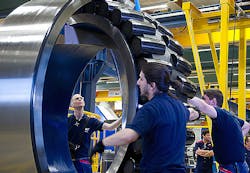Intelligent Grinding Combines Controls, Sensors, and Process Monitoring
Precision grinding of bearing rings and rollers is a well established process, one that has been applied, tested, and analyzed over many years. Until recently, the common view among many grinding companies has been that the technology is close to its peak, and that there is little scope for new or significant technical development.
At SKF, millions of bearing parts are ground every year at our factories around the world, and this has led our engineers to take a different approach. They’ve combined their knowledge engineering skills with the power of the latest intelligent machine technologies. The result is a significant step forward, one that is bringing greater precision, faster cycle times, and even better product quality to the grinding process.
In a typical bearing-grinding machine the quality of the rings and rollers produced deteriorates during the life of the grinding wheel, as it steadily wears. As the wear of the grinding wheel progress, the quality variations of the ground component surfaces increase; typically, in bearing rings and rollers this manifests itself as a change in surface roughness and in diameter and taper dispersion. In addition, inconsistence in the quality of incoming parts will also result in a bigger variation.
Inevitably, this has led to compromises in manufacturing processes to ensure that product quality remains at the highest possible level. In practice, as each grinding wheel wears, the speed of the grinding machine has to be reduced to maintain the correct level of quality. Therefore, production capacity is often determined by the slowest speed to ensure that quality demands are met.
The SKF engineering team knew that with the right control technology, considerable advances could be made. The starting point was to capture the many years of knowledge and experience of the company’s grinding experts, and to match this with a detailed understanding of the grinding process. This included the physical interaction between grinding wheels and the different bearing components, and the mechanical and electronic functionality of each grinding machine.
Next, SKF engineers began to develop a solution that incorporated the latest advances in intelligent machine control, sensors, software, and process monitoring techniques.
The result is the Intelligent Grinding System (IGS) that incorporates a range of sensors and measuring devices supplying detailed data on the production process, including acoustic emission, grinding power and grinding force, to a sophisticated machine controller.
This allows the system to assess the process conditions continuously for each grinding wheel and to make automatic and instant adjustments to the machine settings. In practice, this means that every component has a unique set of grinding parameters, yet is identical in terms of finished quality to every other part manufactured on each machine. The IGS produces consistent, defect-free parts yet at cycle times that are faster than anything that could have been achieved previously.
Such a system would have been impossible a few years ago, because control devices were insufficiently powerful to monitor and control the grinding process in real time. Now, IGS is capable of interpreting data, making intelligent decisions, and adapting to machine operating conditions in milliseconds. The result is faster machining, even greater accuracy and improved output, without the need for human intervention.
For IGS to realize its full potential it has to be used with the latest generation of grinding machines, which themselves are being produced using similarly sophisticated and intelligent manufacturing technologies.
This extraordinary integration of precision engineered mechanical and electronic machine systems, combined with the new generation of machine intelligence, is enabling SKF to transform the face of grinding technology, delivering production line efficiencies and real customer benefits.

